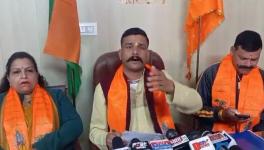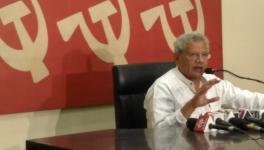Social Solidarity Can’t Exist in a Dystopia of Betrayal

Image courtesy: India Today
Much of the focus in understanding the growing social strife in Indian society has emphasised conflicts between caste and religious groups. This, however, at one level is a symptom of a deeper crisis that is engulfing the collective at all levels of the society. The focus on inter-group conflict has shrouded what is happening within each caste, and within religious groups. The conflict is equally intense within each caste -- internal conflicts within caste and religious groups have complex linkages to how they get expressed as inter-group rivalry and violence.
After neoliberal reforms, two most significant changes have been that of growing aspirations and loosening patron-client relations. Today, no caste group is willing to be represented by the relatively well-off and dominant sections of their own castes. Larger categories of ‘dalit’, ‘other backward classes (OBC)` and ‘Muslim’ are imploding from within. So are the fissures from within even in the dominant social castes, such as brahmins and various other intermediary castes.
Some of this tension is because the vulnerable sections within the castes are asserting and are unwilling to remain silent under the pressure of traditional hierarchies. The intensity of the conflict between various sub-castes within the dalits, OBCs, and even tribals is becoming sharper. Conflicts between sub-sects within Muslims, between Shias and Sunnis, between upper castes and Pasmandas are also silently growing.
For any social identity to survive, domination over vulnerable and weaker sections ‘within’ the group is as important as assertion against the ‘external’ identities. All regional parties today are reduced to single caste-parties. For instance, the Bahujan Samaj Party effectively represents only jatavs, Samajwadi Party of yadavs, Telugu Desam Party of kammas, and so on. Within each of these castes, the poorer jatavs are raising different demands from those who are relatively better-off. Social solidarity within each sub-caste has become tenuous. Being subjugated externally leads to assertion, social solidarity and demands for mobility, but being questioned from within leads to loss of moral positioning, confused subjectivity and self-hatred. Today, the moral worth of individuals and collectives is under stress. We need to make better sense of what internal disunity does to the moral psychology of politics.
French sociologist Emile Durkheim in his study on suicides, notes that suicide is a phenomenon ‘that is the result of social disorganisation or lack of social integration or social solidarity’. Disorganisation refers to a pervasive sense of loss of ‘moral worth’. A nagging feeling of being misrecognised but not knowing what will restore the worth. Collectively this comes when the internal solidarity that existed around the old kind of patron-client relations break down, without providing for alternative kinds of solidarity or fraternity. In such a context, the internalised social values get disturbed, as Durkheim noted.
Social values, such as trust, respect and truth no longer are relatable, as these previously did. Trust was a positive affirmation, but it had also been structured around an old kind of patronage structure. In the loosening patron-client relations, trust is no longer readily available. Similarly, respect flows from mutually agreed values. But in the context of internal dissent, shared values are replaced by mutual indifference. Truth requires singularity and consensus. In the context of growing aspirations for mobility, truth becomes more obstructionist and ‘immoral’ than an enabling social characteristic.
Muslim women demanding more dignity, Hindu women asserting for more autonomy, and lower end dalits rebelling against higher end ones, disturbs the way social groups self-represented themselves. There is no ready moral/political discourse to either counter it or agree to the change. This change is viewed and experienced as a deep sense of loss and betrayal, and translates into more fatalistic resignation.
The early accounts of Hindu Mahasabha, and writings of Hindutva nationalists such as Savarkar, and Golwalkar, show that while they viewed Muslims as the primary enemy, their ‘real’ trauma was `internal` questioning from dalits and other castes, which they articulated as lack of unity within the Hindus. It is this lament of lack of visible unity within Hindus that makes hating Muslims axiomatic. The paranoid accounts of Muslim aggression had to do much with this sense of erosion of Hindu unity from within. The latter is a more intimate loss, and a conflict that cannot have legitimate political articulation other than taking the route of conspiracy, paranoia and crime. The ‘intimate enemy’ ushers in self-hatred, as there is no legitimate way of articulating it except either as a misfortune, fatalism, or a self-deprecating sense of self-blame, internal weakness, and something that one feels too guilty and ashamed to publicly negotiate.
What Hindutva nationalists felt almost a century ago has today become more generic due to large-scale sociological changes. The sense of loss that they felt as ‘Hindus’, is being experienced by each individual caste group, leading to internal assertions. Loosening of caste identities has no readily available political language to articulate them. The loss of moral worth and a pervasive sense of self-hatred is gripping across caste and religious groups, which partly explains the sudden and rather dramatic ascendance of Hindutva nationalism. The language, vision and politics that was in the waiting for almost a century, has gone mainstream today and many social groups are finding in it a story they can relate to. The narrative of ‘internal enemy’ and national security has resonance with these insidious changes and carry with them multiple meanings that cannot be easily disaggregated. It is this unstated ‘loss’ that is being effectively articulated in the ‘empty` aggression of Hindutva nationalism.
In order to understand what is happening between Hindus and Muslims, or dalits and OBCs, we need to focus on what is happening internally in each of these identities. The questions that are gaining new valency are, how does one offset the sense of ‘betrayal’ leading to loss of ‘moral worth’? In what ways is self-hatred the source of external aggression? Where do we begin to stitch a new imagination of social solidarity? Social solidarity cannot co-exist with a pervasive sense of betrayal.
The writer is Associate Professor, Centre for Political Studies, Jawaharlal Nehru University, Delhi. His forthcoming book is on ‘Secular Sectarianism: Limits of Subaltern Politics’. The views are personal.
Get the latest reports & analysis with people's perspective on Protests, movements & deep analytical videos, discussions of the current affairs in your Telegram app. Subscribe to NewsClick's Telegram channel & get Real-Time updates on stories, as they get published on our website.

















